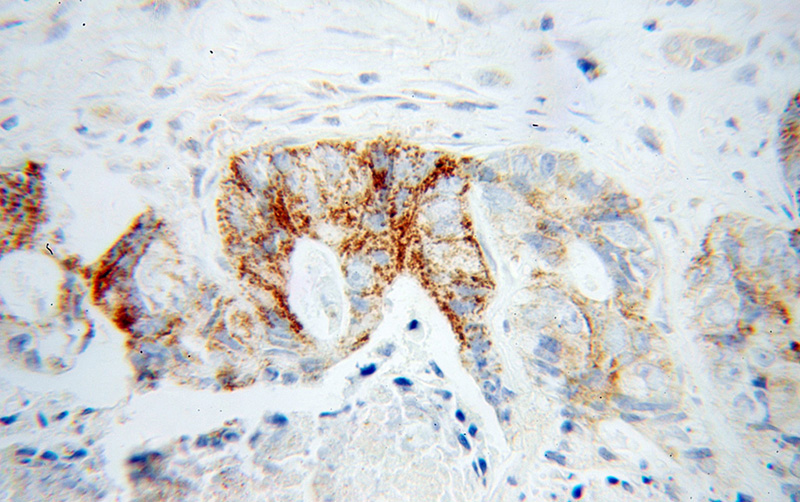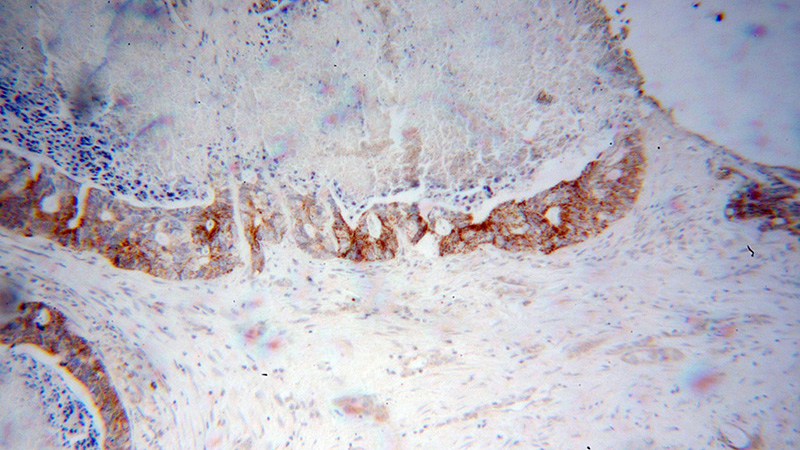-
Product Name
CRLS1-Specific antibody
- Documents
-
Description
CRLS1-Specific Rabbit Polyclonal antibody. Positive IHC detected in human liver cancer tissue. Observed molecular weight by Western-blot: 32 kDa
-
Tested applications
ELISA, IHC
-
Species reactivity
Human,Mouse,Rat; other species not tested.
-
Alternative names
C20orf155 antibody; Cardiolipin synthase antibody; cardiolipin synthase 1 antibody; CLS antibody; CLS1 antibody; CRLS1 antibody; dJ967N21.6 antibody; GCD10 antibody; Protein GCD10 homolog antibody
-
Isotype
Rabbit IgG
-
Preparation
This antibody was obtained by immunization of Peptide (Accession Number: NM_019095). Purification method: Antigen affinity purified.
-
Clonality
Polyclonal
-
Formulation
PBS with 0.02% sodium azide and 50% glycerol pH 7.3.
-
Storage instructions
Store at -20℃. DO NOT ALIQUOT
-
Applications
Recommended Dilution:
IHC: 1:20-1:200
-
Validations

Immunohistochemical of paraffin-embedded human liver cancer using Catalog No:109567(CRLS1-Specific antibody) at dilution of 1:50 (under 40x lens)

Immunohistochemical of paraffin-embedded human liver cancer using Catalog No:109567(CRLS1-Specific antibody) at dilution of 1:50 (under 10x lens)
-
Background
Cardiolipin (CL) is a mitochondrial specific double negatively charged phospholipid which is intricately involved in regulating bioenergetic efficiency. In eukaryotes, CL is synthesized by cardiolipin synthase (CRLS1 or CLS1) which catalyzes the reversible phosphatidyl group transfer from one phosphatidylglycerol molecule to another to form CL and glycerol. Recently it has been reported that transgenic expression of CRLS1 accelerates cardiolipin remodeling, improves mitochondrial function, modulates mitochondrial signaling, and attenuates mitochondrial dysfunction during diabetes, thereby identifying CRLS1 as a novel therapeutic target to attenuate mitochondrial dysfunction in diabetic myocardium.
-
References
- Peyta L, Jarnouen K, Pinault M. Reduced cardiolipin content decreases respiratory chain capacities and increases ATP synthesis yield in the human HepaRG cells. Biochimica et biophysica acta. 1857(4):443-453. 2016.
- Kiebish MA, Yang K, Sims HF. Myocardial regulation of lipidomic flux by cardiolipin synthase: setting the beat for bioenergetic efficiency. The Journal of biological chemistry. 287(30):25086-97. 2012.
- Peyta L, Jarnouen K, Pinault M. Regulation of hepatic cardiolipin metabolism by TNFα: Implication in cancer cachexia. Biochimica et biophysica acta. 1851(11):1490-500. 2015.
Related Products / Services
Please note: All products are "FOR RESEARCH USE ONLY AND ARE NOT INTENDED FOR DIAGNOSTIC OR THERAPEUTIC USE"
